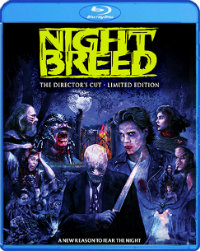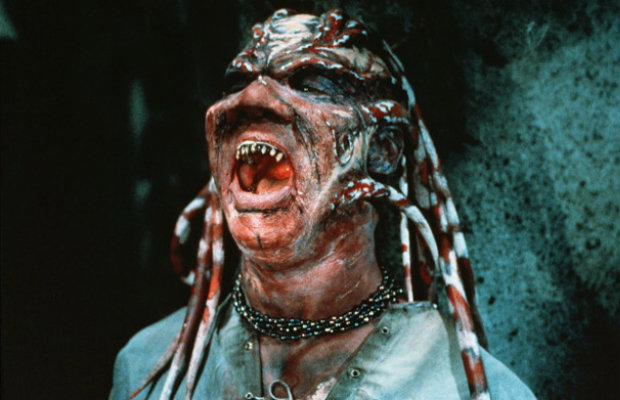Disc Reviews
Nightbreed: The Director’s Cut | Blu-ray Review
 Back in 1990, just prior to its release, 20th Century Fox recut Nightbreed drastically, attempting to shift its somewhat progressive, fantastical subtext into the format of a relatively standard slasher film. Though Clive Barker managed to get the film funded in part by the cult success of his oft-misunderstood examination of aberrant sexual desire, Hellraiser, the notion of marketing a film that deliberately subverted the existing hero ethos—positing outsiders as victims rather than villains—was a little too much for a wide release with a video game tie-in. The resulting film was understandably an intriguing mess that genuinely felt unfinished or at least lacking in the usual depth of purpose associated with Barker’s work.
Back in 1990, just prior to its release, 20th Century Fox recut Nightbreed drastically, attempting to shift its somewhat progressive, fantastical subtext into the format of a relatively standard slasher film. Though Clive Barker managed to get the film funded in part by the cult success of his oft-misunderstood examination of aberrant sexual desire, Hellraiser, the notion of marketing a film that deliberately subverted the existing hero ethos—positing outsiders as victims rather than villains—was a little too much for a wide release with a video game tie-in. The resulting film was understandably an intriguing mess that genuinely felt unfinished or at least lacking in the usual depth of purpose associated with Barker’s work.
After some years had passed and the Internet was able to facilitate conversations that would otherwise never happen, some of the cut footage was found in rough VHS form, leading to the creation of “The Cabal Cut” of the film, which developed a rather substantial underground cult following. This buzz led to the release of the original camera negative from the studio and Shout Factory’s release of Barker’s original director’s cut of the film, featuring over 40-minutes of new footage mastered in high definition with an updated score.
This cut, which clocks in around two-hours, brings an entirely new meaning to the title. In the truncated cut, the focus was on the relationship between the troubled Aaron Boone (Craig Sheffer) and his psychiatrist, Dr. Philip K. Decker (David Cronenberg), whose name is a nod to acclaimed author, Philip K. Dick. Decker’s after house tendency to slaughter entire families and pin it on his conflicted patient drove the film, as did the romance between Boone and his musician girlfriend Lori (Anne Bobby). His need to escape to Midian (deliberately named after the place where Moses went in self-exile) where monsters lived underground wasn’t really explained or expanded on beyond aiding an ultimate climax where the serial killer was given his comeuppance.
In this version of the film, the monsters and the meaning of Midian are given a far more substantive role, clarifying just what Barker’s motivation was in adapting his novel, Cabal, to screen. Early on, Boone has dreams of Midian and fantasizes about escaping to a place where he can be himself. His psychiatrist, having a better understanding of Boone than Boone has of himself, exploits this nagging desire to convince the boy that his perverse fantasies are an indicator of a greater mental illness. The fact that Dr, Decker targets the nuclear family—who he notes as “breeders”—for his killing ritual is as pointed as it is deliberate in making metaphoric heteronormative anxieties about the “other” a cinematic reality.
What’s present here that wasn’t in the theatrical cut back in 1990 is the extended universe that is Midian. Once Boone escapes to this underground community—one that’s literally underground, beneath a cemetery in Northern Alberta—we introduced to an array of complex characters that, despite being “monsters” in a visual sense, have a well-formed social structure that doesn’t threaten the normal world despite what appearances might suggest. That the title of the movie is “Nightbreed” and that they’re all living in an elaborate cruising ground reiterates the likelihood that “Nightbreed” is referring to unprotected gay sex in a cruising destination just as much as it is the “breed” of monsters we’re seeing on screen.
As such, the presentation of a homosexual lifestyle as sanctuary ultimately appears to be what threatened and confused the studio back in 1990 and explains why it would be more readily accessible in a modern context. It also makes the film a far more coherent experience, even if it’s a tad dated nearly 25-years later and is a little ham-fisted in its need to make the subtext abundantly clear.
Though it will likely never happen, this story would be served well by the extended miniseries format with a stronger lead actor. The story being told is still quite vital to this day, tackling heteronormative fear head-on without any flowery embellishment or politically correct delusions about what homosexuality represents to the status quo, while simultaneously creating a very creative, elaborate environment and roster of fantastical characters. There’s a lot here to work with and Barker did what he could with his vision (based on his limited experience as a director) but it all ultimately reveals a potential that was never fully realized.
Disc Review
Presented with a high definition widescreen 1.78:1 with DTS-HD Master Audio 5.1, this version of Nightbreed is surprisingly clear for such a grainy source film with an abundance of footage that’s been sitting in a vault for over two decades. Though standard for a conversion of an older film, this is, by far, the best existing version of Clive Barker’s cult film.
Introduction By Writer/Director Clive Barker:
This introduction is roughly five-minutes and plays before the film without prompting. It provides some context on the history of getting this director’s cut put together and how challenging it was to find the original footage.
New Interviews with the Cast and Crew:
Shout Factory was able to obtain new interviews with Craig Sheffer, Anne Bobby, Doug Bradley and an abundance of other secondary actors who discuss, at length, the casting process and what it was like to film underneath an abundance of practical make-up. Since most of the secondary cast had worked on Hellraiser and Hellraiser 2, there are an abundance of anecdotes about Barker and what it was like to make these three films back-to-back. Though most of the gang is quite coherent, offering up great insights on the project, Anne Bobby prattles on about animal rescues, comparing her character in the film to Odysseus.
Final Thoughts
This version of Nightbreed is essential viewing for anyone interested in the lexicon of genre cinema. It’s particularly important that Barker fans see this to understand what it was he was trying to do. There’s nothing technically astonishing about this version—it’s serviceable—but this director’s cut of the film is a must-have for collectors.
Film: ★★★/☆☆☆☆☆
Disc: ★★★½/☆☆☆☆☆
Robert Bell is a Toronto-based film critic for IONCINEMA.com and Exclaim! Magazine, where he was also the editor for film festivals and books. Robert covers North American Film Festivals such as Sundance, Hot Docs, Tribeca and TIFF. Robert studied film theory and screenwriting at York University and has a background in independent film production. Top Films From Contemporary Film Auteurs: Campion (The Piano), Kiarostami (Certified Copy), von Trotta (Hannah Arendt), Marsh (The Theory of Everything), Haneke (The White Ribbon), von Trier (Antichrist), Seidl (Dog Days), Moodysson (Lilya 4-Ever), Ramsay (Ratcatcher). Winterbottom (The Claim), Malick (The Tree of Life), Ceylan (Once Upon a Time in Anatolia), Cronenberg (Dead Ringers), Verhoeven (Starship Troopers), Bigelow (Point Break), Jordan (The Crying Game), The Dardennes (Lorna's Silence), Zyvagintsev (The Return), Porumboiu (Police, Adjective), Ozon (Dans la Maison).

































